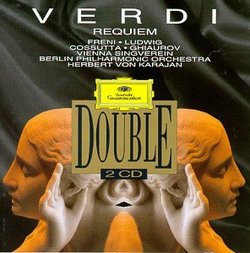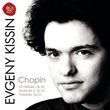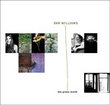| All Artists: Giuseppe Verdi, Herbert von Karajan, Berlin Philharmonic Orchestra, Mirella Freni, Carlo Cossutta, Christa Ludwig Title: Verdi: Requiem Members Wishing: 0 Total Copies: 0 Label: Deutsche Grammophon Release Date: 11/22/1994 Genre: Classical Styles: Opera & Classical Vocal, Historical Periods, Early Music, Modern, 20th, & 21st Century Number of Discs: 2 SwapaCD Credits: 2 UPC: 028943747325 |
Search - Giuseppe Verdi, Herbert von Karajan, Berlin Philharmonic Orchestra :: Verdi: Requiem
 | Giuseppe Verdi, Herbert von Karajan, Berlin Philharmonic Orchestra Verdi: Requiem Genre: Classical
|
Larger Image |
CD DetailsSimilarly Requested CDs
|
CD ReviewsBest of a mixed bag P. Yale | England | 09/05/2000 (4 out of 5 stars) "I have listened to a good number of the many available recordings of this work, and have never been truly satisfied with any of them. I regard this, along with Robert Shaw's recording, as one of the best available. There is a fine quartet of soloists, Freni, Ludwug and Ghiaurov needing no recommendation, whilst the tenor Carlo Cossutta makes a fine contribution and I'm surprised he is not better known. All 4 are well-balanced, and just listen to Freni's floated top note in the Libera Me (more than a hint of studio reverb seems to have been added, but the end result is quite delicious and I can easily turn a blind eye [ear?] to minor meddling of this sort).Karajan and the BPO are rock-steady together, and although there has been criticism of some of Karajan's tempi (especially in the Sanctus) I have to say I don't find this to be a problem. I've heard more dramatic Dies Irae bass drum hitting in other performances - this is a little underwhelming, but not seriously, and the rest of the movement sails along. My only serious complaint is about the Vienna Singverein, the ladies of which frequently display excessive individual vibrato which simply doesn't blend well in a large chorus. This doesn't irredeemably spoil things, but it stops me giving a 5* rating.Just for the record, my personal recommendation of recordings to AVOID would include the following:1) Abbado (Studer and Carreras - Carreras is AWFUL) 2) Solti (Sutherland, Horne, Pavarotti, Talvela - not really Sutherland's repetoire at all; she isn't dramatic enough when it counts, and (as always) her diction is abysmal) 3) Giulini (Schwarzkopf, Ludwig, etc. - Schwarzkopf is the disappointment here. Like Sutherland, I don't think this is her repetoire - too cool and Germanic for the no-holds barred Italian passion required, especially in the Libera Me)" Verdi Requiem - Herbert von Karajan Mr Bassil A MARDELLI | Riad El-SOLH , Beirut Lebanon | 04/08/2008 (5 out of 5 stars) " Verdi much idolized Alessanrao Manzoni, the famous Italian poet, humanist, writer and novelist. ""O'Lord! Grant them eternal rest"" was the principal musical setting of the Requiem that Verdi devoted to the first anniversary immortalizing his idol. Verdi's Requiem was performed in the church of Saint Marco - Milan in May 1874. This ninety minutes masterpiece - assigned for a large orchestra - is often referred to as the Manzoni Requiem. Verdi began composing in June 1873. He travelled to Paris where he included a revised version of the `Libera me' that was originally written for Rossini. Almost one hundred years later, and as always, Herbert Von Karajan, throughout his outstanding conducting techniques, has been able to `translate' the powerful emotions, the energetic rhythms, the elevated melodies, and the exalted ideals in the full texts. "Dies Irae" is superb; some two and a half minutes that bring the traditional sequence of the Latin funeral rituals. Music flows like in a fountain and is repeated with forceful sense of musical continuity, exploring the feelings of loss and sorrow as well as the human supplication for forgiveness and mercy found in splendid cohesive notes. In 1972, Karajan had become a world figure and hence an object of intense jealousy on the part of his less fortunate colleagues. But who could have given us better interpretation than this greatest `Verdian'- Karajan. Listen to the jubilant "Sanctus" - here it begins with lively fanfare to announce Him "who comes in the name of the Lord" and leads into an angelic "Agnus Dei" sung by the female soloists with the chorus. Finally the "Libera me," the oldest music by Verdi in the Requiem, interrupts. The soprano cries out, praying, "Free me, Lord, from eternal death ... when you will come to judge the world by fire."................. " Lovely Performance, But... A. C. Cushman | South Norwalk, CT USA | 06/06/2002 (4 out of 5 stars) "I bought this album with a lot of expectations -- especially since Freni is my all-time favorite soprano. And there is much to admire here -- Mme. Freni most of all. The balance of soloists is generally fairly good and the chorus sounds terrific. But overall, this performance did not impress me as I'd hoped. To my mind, the main flaw comes fairly early, specifically the first entrance of the tenor soloist. After the opening minutes of the soft, low choral "requiem," the sudden forte entry of the tenor should be a stunningly dramatic moment -- a real mind blower in every sense of the word. The first time I listened to this performance, I missed that moment entirely and had to rewind several times before I caught it. I don't blame the tenor, he sings the passage perfectly well; the fault clearly lies with Maestro Karajan. There's no sense of build-up, of unbearable tension just before the entrance -- so the drama is lost. A shame, really, and not the only time that I sense Karajan taking the work a bit for granted.I have yet to find a recording that betters the one with Riciarelli, Verrett, Domingo and Ghiarov as the soloists. I believe the choris is the Teatro della Scala. The conductor is either Guilini or Abbado. Regretfully, I don't own a copy; my radio station has a vinyl version -- rather scratched unfortunately. I have yet to see that performance re-released on compact disc. It's a DG property like this one, so I hope they re-issue it at some point. I'll be first in line when/if they do!"
|

 Track Listings (10) - Disc #1
Track Listings (10) - Disc #1








